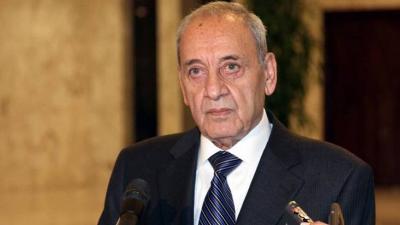Speaker Nabih Berri made a significant move yesterday that surprised parliamentary blocs, especially the sovereign ones, before the results of their communications yielded an agreement on the name of the candidate they would support. He seized the initiative in the presidential matter, cutting off any possibility of blaming him for delays in electing the new president, and addressing the reputation for shutting down parliament that was attributed to him during the period between 2014 - 2016, which saw a presidential vacancy extending beyond two years and five months. His opponents, particularly the hardliners of the March 14 Forces, were saying he closed parliament in collaboration with “Hezbollah” back then, even though he called for about 45 sessions to elect the president. However, due to the obstruction of his ally “Hezbollah” and the ally of his ally “the Free Patriotic Movement,” the quorum for the sessions was never met until the party's opponents eventually acquiesced, resulting in major blocs accepting the election of Aoun for the presidency.
Berri's rapid initiative carries many objectives, perhaps the most notable being to urge parliamentary blocs to reveal their preferred candidate and their stance on ensuring a two-thirds quorum for the session. It also questions which parties might boycott the session to obstruct it: the sovereigns and reformists or those belonging to the resistance axis allied with “Hezbollah.” Additionally, his circles indicate the importance of his initiative in calling for a session tomorrow to elect the president, aiming to prompt all blocs to hasten their decision regarding the presidential entitlement and not to think they have ample time until October 31, unless the blocs are calculating towards a presidential vacancy.
Today and until dawn tomorrow will be filled with consultations that began yesterday afternoon within the blocs and among them. All blocs must clarify their position within 24 hours, whether regarding a potential candidate or their stance on the quorum for the session. All scenarios are being prepared to choose how to deal with each one.
One scenario suggests that the call for tomorrow’s session may have resulted from the Shia duo's definitive decision to support the nomination of the head of the “Mardini” movement, Sleiman Franjieh, since he belongs to the broad coalition surrounding “Hezbollah,” and if the two-thirds quorum (86 deputies) is secured, a first round of voting takes place, in which Franjieh does not obtain a two-thirds majority, followed by a second round requiring an absolute majority (65 deputies) in which that number votes in his favor. This is the same number that Berri secured when electing the Speaker of Parliament and which Deputy Speaker Elias Bou Saab obtained. The call for the session may be a preemptive move against an agreement among the opposition's sovereign blocs.
If the sovereigns find this scenario plausible, will they resort to the second scenario of obstructing the two-thirds quorum? The third scenario suggests that no candidate will win either the two-thirds or the absolute majority, because the conditions for electing a president differ from those for the Speaker of Parliament and the Deputy Speaker. In that election, the “Democratic Gathering” bloc and some Sunni independents, as well as certain MPs from the Free Patriotic Movement, aligned with Berri’s choice, although some abstained from supporting Bou Saab, who received the backing of the Aoun bloc, while reformist lawmakers abstained from voting for his competitor Dr. Ghassan Skaff.
Those advocating this scenario point to the fact that MPs from the “Democratic Gathering” will not vote for Franjieh due to a rejection from allied countries to repeat a party ally as president, primarily including the United States, Saudi Arabia, and even France. Jumblatt has publicly stated that he will not vote for the president of the “Mardini” movement. According to his sources, he believes that Franjieh has improved his image and that his family has open relations with various Lebanese families and other sects, in contrast to the exclusionary nature of the Aoun bloc. Nonetheless, he ultimately adheres to the will and policy of Haret Hreik (the Hezbollah stronghold) and Syria and cannot be independent of them.
Furthermore, Jumblatt had urged “Hezbollah” in his dialogue to avoid bringing in a president “neither from our side nor from yours” and to agree on a technical economic figure to help pull the country out of the economic crisis and achieve reforms that, according to his circle, have not been realized concerning banking secrecy, restructuring banks, capital control, and electricity. This figure should be able to address all parties, especially the international community and Arab countries. Meanwhile, some northern Sunni MPs who voted for Berri as Speaker will take into account Saudi concerns regarding electing a president close to Hezbollah and the Iranian axis, especially after the recent Saudi movements, particularly with Sunni MPs.
This third scenario leads to the conclusion that in this case, the Shia duo would have proven to Franjieh that they attempted to bring him as president, necessitating a search for an alternative. “Hezbollah” might hold meetings with certain figures proposed by other parties in hopes of reaching an agreement to support them.
So, does Berri's call pave the way for a scenario of consensus, alleviating disputes over the government and its formation by the emergence of a president?




